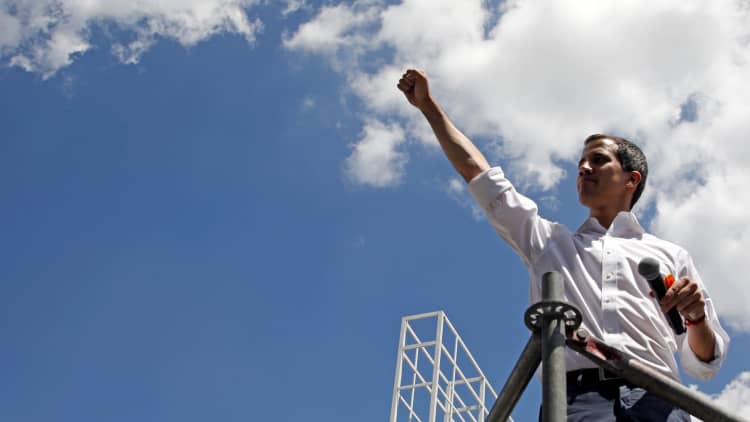The U.S., European Union and other countries around the world have accused Venezuela's government of torturing and murdering a Navy captain held over an alleged plot to assassinate President Nicolas Maduro.
Rafael Acosta Arevalo, a 49-year-old navy captain, died in the early hours of Saturday morning after being rushed to a hospital in the capital city of Caracas, the South American country's defense ministry said in a statement.
He appeared in court on Friday but fainted before proceedings could begin.
Acosta was detained on June 21 and charged with treason and conspiring to rebel. He denied the charges.
Venezuela's government has said it will investigate Acosta's death, but has not elaborated on the cause or circumstances preceding it.
"No one, absolutely no one can remain indifferent to this horror, let alone the men and women of the armed forces," Guaido said via Twitter over the weekend.
"It is up to us to be united to put an end to a dictatorship that tortures and murders," he said in another tweet.
The Lima Group, which is comprised of 11 Latin American countries and Canada, reportedly said that Acosta exhibited "visible signs of torture" when he was brought before a military tribunal on Friday.
His death comes a week after United Nations human rights chief Michelle Bachelet visited Venezuela to investigate allegations that Maduro's security forces had tortured and killed members of the opposition.
'Cannot go unpunished'
Maduro has intensified a crackdown on subversives and "coup plotters" in the weeks following a failed military uprising attempt on April 30.
The EU said in a statement published late Sunday that Acosta's death marked "another stark illustration of the arbitrary nature of the judicial system in the country and the lack of guarantees and rights for those under detention."
"His death cannot go unnoticed nor unpunished. A full and independent investigation is necessary so that those responsible are held accountable," the EU said.
Meanwhile, the U.S. State Department said Sunday that the naval officer died while in the custody of "Maduro's thugs and their Cuban advisers."
"This latest act of Maduro's barbarism must stir us into action," the statement said.

In the U.K., Vanessa Neumann, the chief diplomat for Guaido, urged the government to act swiftly.
"For centuries, the U.K. has been a leader in the rule of law, due process, and human rights. We look to you now to maintain those values and advocate for them in Venezuela and condemn the brutality of the usurping, torturing, kleptocratic, and drug trafficking Maduro regime," she said via email Sunday.
What is the background?
The South American country is in the midst of one of the Western Hemisphere's worst humanitarian crises in recent memory, with some 4 million people having fled the country since 2015 amid an economic meltdown.
A protracted political stand-off has thrust the oil-rich, but cash-poor, country into uncharted territory — whereby it now has an internationally-recognized government, with no control over state functions, running parallel to Maduro's administration.
Guaido assumed a rival interim presidency in January, citing Venezuela's constitution, and denounced Maduro's government as illegitimate after he secured re-election last year in a vote widely criticized as rigged.
Guaido has since been recognized by more than 50 countries, including the U.S. and most Latin American and European countries.
However, Maduro has refused to cede power. And, crucially, he still has the broad support of the military.


